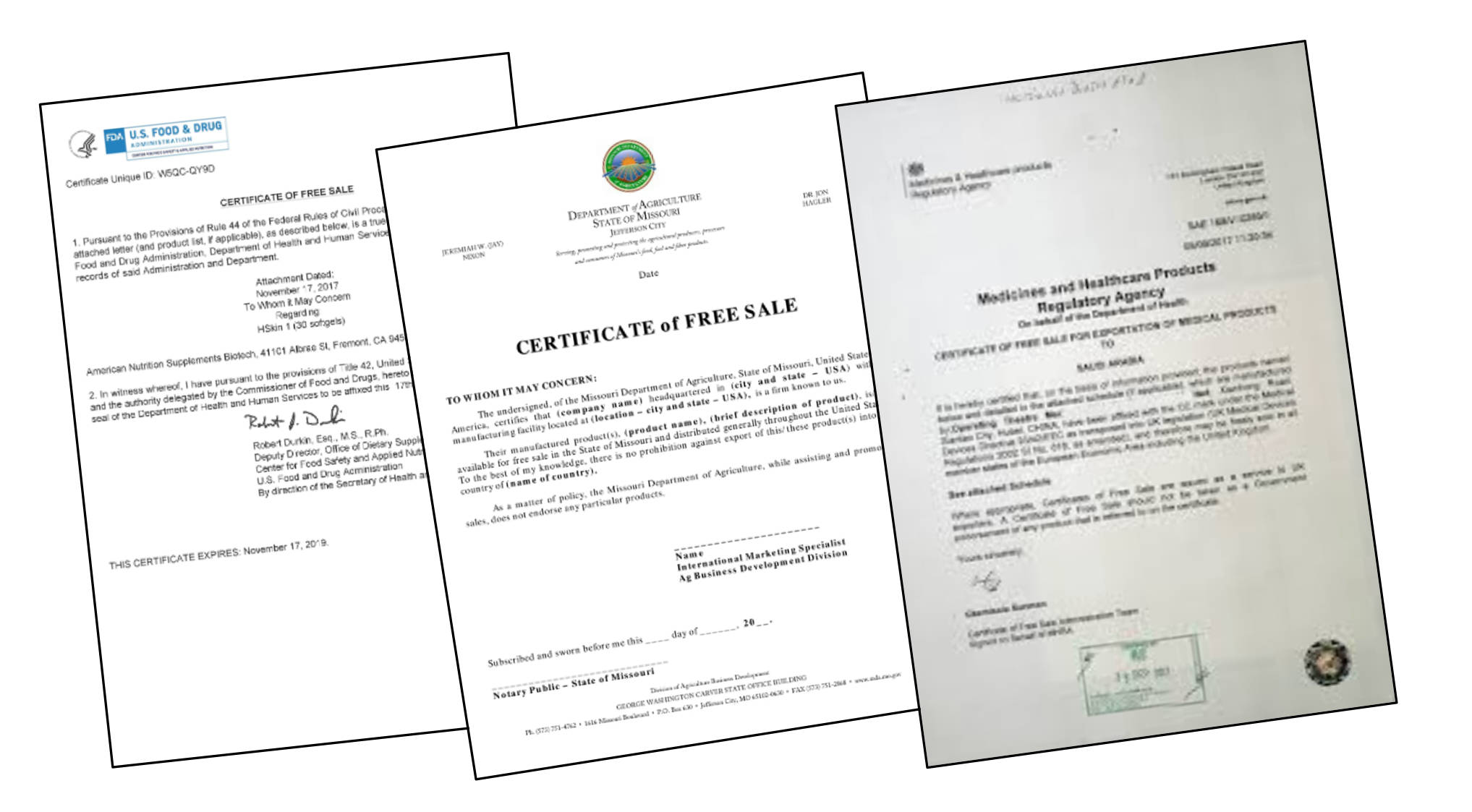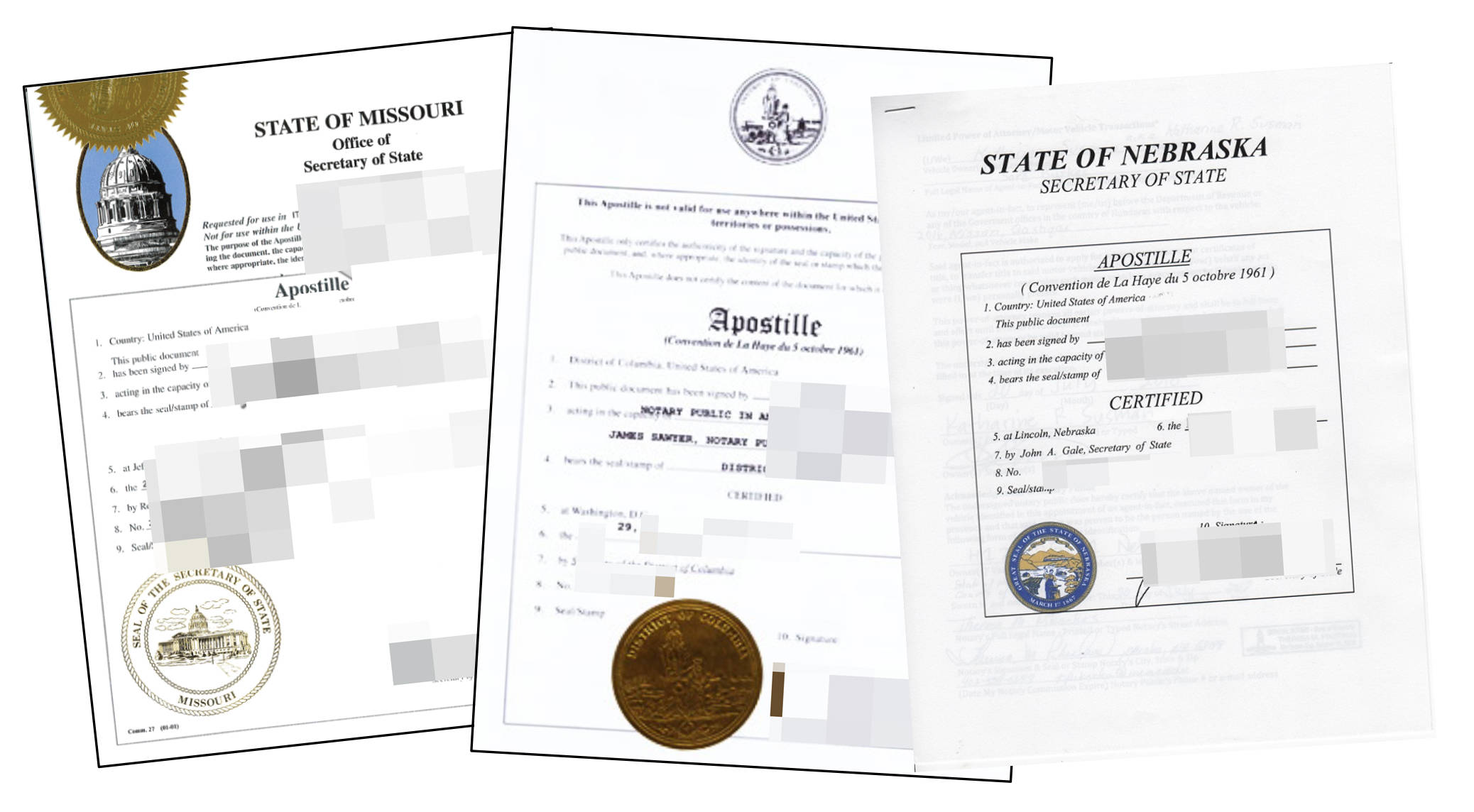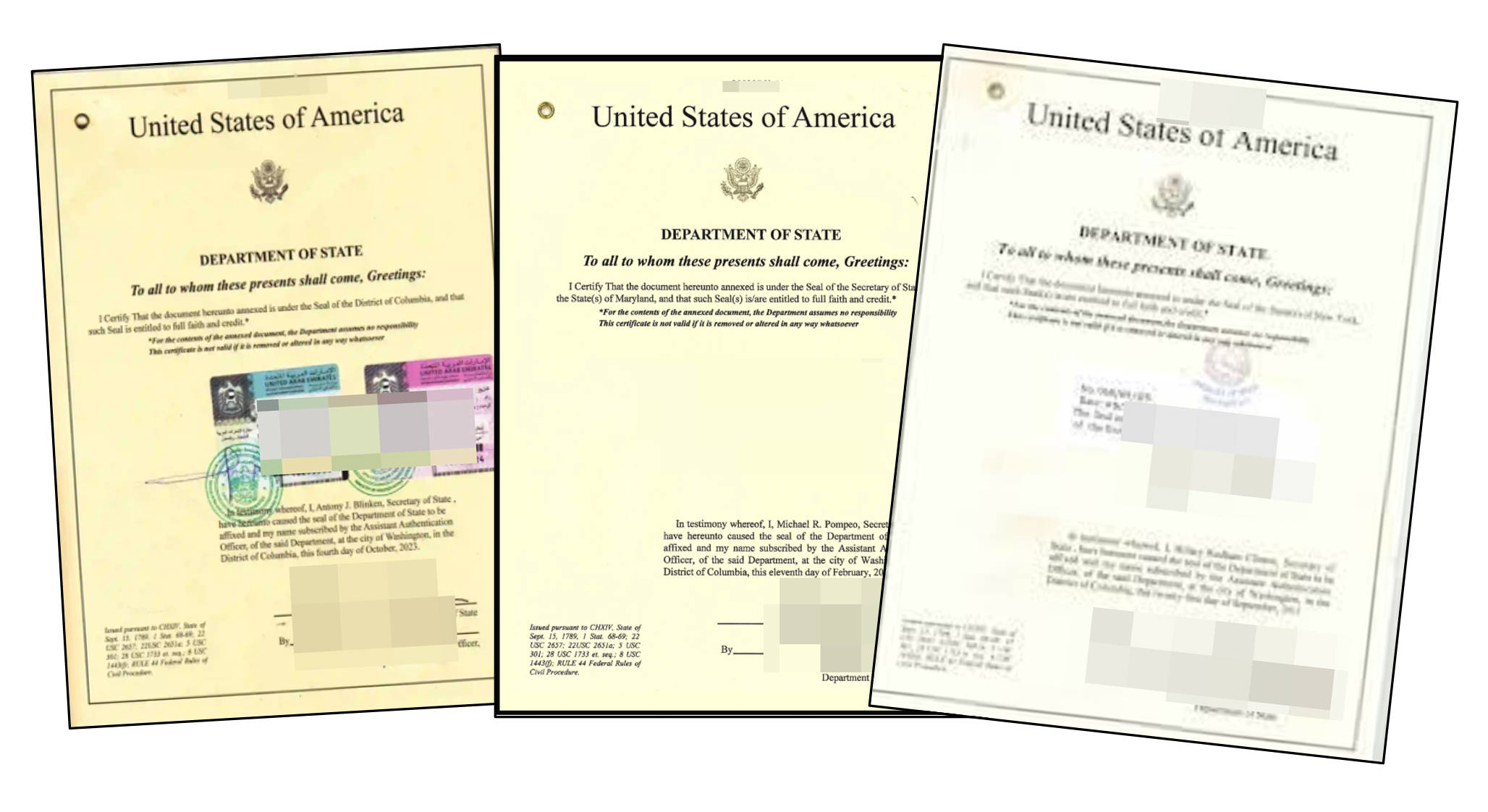Hague certification and consular authentication for a U.S. Free Sale Certificate

What is a U.S. Free Sale Certificate?
A U.S. Free Sale Certificate, also known as a Free Sale Certificate, is a document that certifies a product is legally sold in its country of origin. When companies seek to export their products to foreign markets, the government of the importing country may require this certificate to ensure that the product has been approved for sale in the country of manufacture and meets safety standards.
For example, products such as food, pharmaceuticals, and cosmetics produced in the United States often require this certificate before being exported to other countries. This serves as proof of their quality and regulatory compliance.
Example of a U.S. Free Sale Certificate
When it comes to the U.S. Free Sale Certificate, many people may not be very familiar with where it comes from or what it’s used for.
Imagine you manufacture a batch of food, dietary supplements, or medical devices in the United States, and you want to sell them in another country, such as China. The customs and regulatory authorities there will need to confirm whether your products are legally sold in the U.S. market.
This is where the Free Sale Certificate comes in. It serves as proof to foreign governments that your products are not illegal, unregistered, or made in unlicensed facilities. Instead, they are fully compliant and legally sold in the U.S. market.
To give a more specific example, let’s say your product is manufactured in a legitimate factory in Los Angeles, California. You contact the California Department of Public Health or the local business authorities to issue a Free Sale Certificate. They will provide an official document stating that the product is legally sold within the U.S. and complies with relevant laws and regulations. It’s like they are endorsing it: “This guy’s product is fine in the U.S. market!”
With this certificate, it will be much easier to convince the approval authorities in China that your product is not a “three-no” product (unlicensed, unregistered, and unsafe), but rather a legitimate item already recognized in the U.S. market.
Why Do You Need to Get This Certificate?Think about it: when your product crosses the ocean and arrives in China, without some convincing proof, why should Chinese customs or regulatory authorities clear it for entry? They certainly need to verify whether your product has been legally sold in the U.S. If you don’t have such a certificate, how would they know if you’re trying to pass off an experimental product or something that hasn’t been properly vetted?
Here’s another scenario: Imagine you’re in Shanghai, China, and you want to sell this batch of U.S. products—especially those related to health and safety, like food, dietary supplements, or cosmetics. You must register or file these products with Chinese authorities. During this registration or filing process, Chinese regulators often require proof that the products are legally sold in the U.S. This is where the Free Sale Certificate comes into play.
In a big city like Shanghai, this certificate is incredibly useful. It helps your U.S. imported goods gain market access in China, ensuring they can circulate and be sold legally within the country.
Here’s the Issue.Now, here’s the problem: You have the U.S. Free Sale Certificate, but China still requires you to provide legalized documentation. On one hand, you need to ensure that the Chinese government recognizes the authenticity of this document and verifies that it was issued by U.S. authorities. In the past, you would have to go through a complicated consular authentication process—first getting it certified by the U.S. Secretary of State, and then going to the Chinese consulate for further certification. This was a real hassle. Not only was the process tedious, but it also took time and cost money.
The good news is, on March 8, 2023, China announced it had joined the Hague Convention Abolishing the Requirement of Legalization for Foreign Public Documents (also known as the “Hague Apostille Convention”). This agreement officially came into effect in China on November 7, 2023.
What does this mean? Simply put, as long as your document has been apostilled in the U.S., China will recognize this Hague Apostille and you no longer need to go through the extra step of consular authentication.
So, you contacted the Washington, D.C. Notary Office to help you get the U.S. Free Sale Certificate apostilled. As the capital of the United States, Washington, D.C. is a highly authoritative location for notary and certification services. After they process it, the Free Sale Certificate will receive an Apostille from the U.S.
With this Apostille, your document will be directly recognized in China, and you won’t have to go through the lengthy consular process. As a result, your clients in China can more quickly and smoothly introduce your U.S.-made products to the market, saving a lot of time and effort. This also makes international trade compliance much more streamlined.
In summary, the U.S. Free Sale Certificate is one of the key documents that unlocks the door to the Chinese market, while the Hague Apostille from the Washington, D.C. Notary Office makes this process much more time-efficient and less burdensome. For your clients who want to bring U.S. products into the Chinese market, this entire procedure acts like an express lane. It not only facilitates smoother registration and filing in China but also boosts the credibility and persuasiveness of their products in the eyes of Chinese consumers.
This whole process exemplifies the role of a “trust accelerator” in international trade—once it’s in place, cross-border business activities can move more smoothly on both the legal and market fronts.
We share these examples to help everyone better understand the related processes and application scenarios. Please note: the company names and individual names mentioned in this explanation are entirely fictional. Any resemblance to real companies or individuals is purely coincidental. Our case studies are for reference purposes only, intended to provide a framework for thinking and decision-making, so you can make more informed choices in your actual business decisions. When applying the information from these examples, please carefully consider your own circumstances and, when necessary, seek professional advice or further verification.
What is a U.S. Hague Apostille?
The Hague Apostille is an international certification process established under the 1961 Hague Convention Abolishing the Requirement of Legalization for Foreign Public Documents. This certification ensures that official documents (such as birth certificates, academic credentials, business documents, etc.) are recognized across the countries that are signatories to the convention.
For the Free Sale Certificate (FSC), obtaining a Hague Apostille means that once the document is apostilled in the U.S., it will be accepted by all countries that have signed the 1961 Hague Convention without needing further verification.
What is U.S. Consular Authentication?
Consular Authentication, also known as Authentication, is typically required for countries that are not part of the Hague Convention. This process involves multiple steps, including both state-level and federal-level official verification, to confirm that a document is authentic.
For countries that do not accept the Apostille, consular authentication serves as a bridge, providing international recognition for documents like the Free Sale Certificate (FSC). This process ensures that the document will be accepted by the relevant authorities in countries that don’t recognize the Apostille.
Notary Services in Washington, D.C. for Apostille and Consular Authentication
In Washington, D.C., there are specialized notary offices that offer services for Hague Apostille and Consular Authentication. These services save businesses valuable time and effort, especially when dealing with the complex process of international document certification. Whether your document requires an Apostille or consular authentication, the notary offices in Washington, D.C. can provide professional assistance to ensure that your documents meet the legal requirements of the destination country and smoothly complete the export process.
Apostille Sample

Authentication Sample
